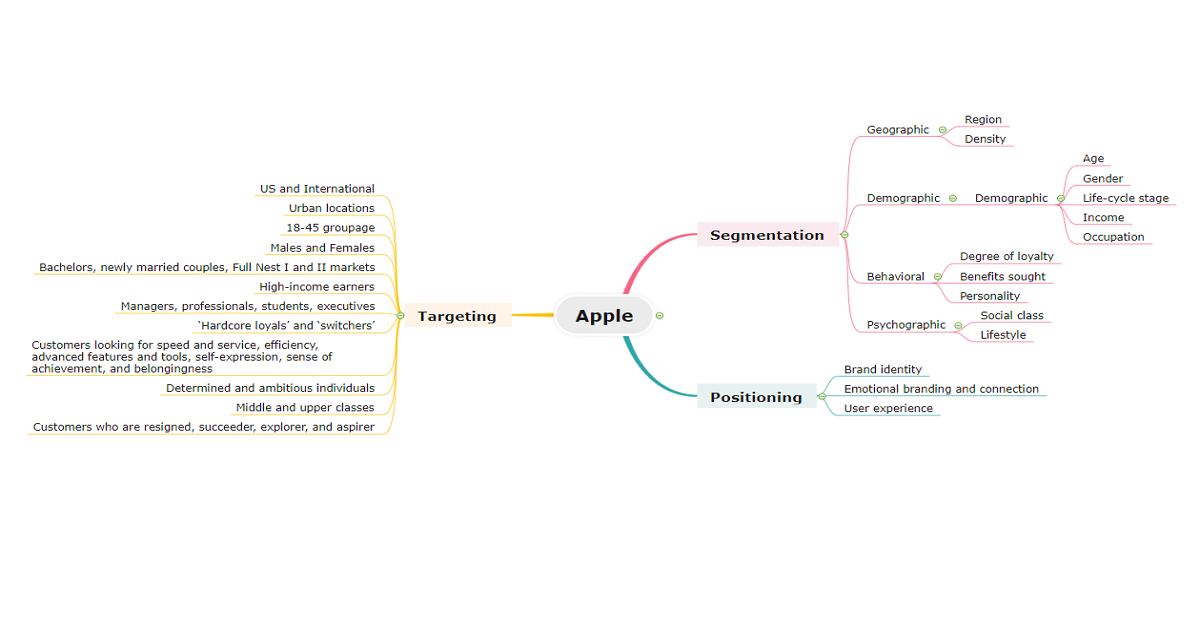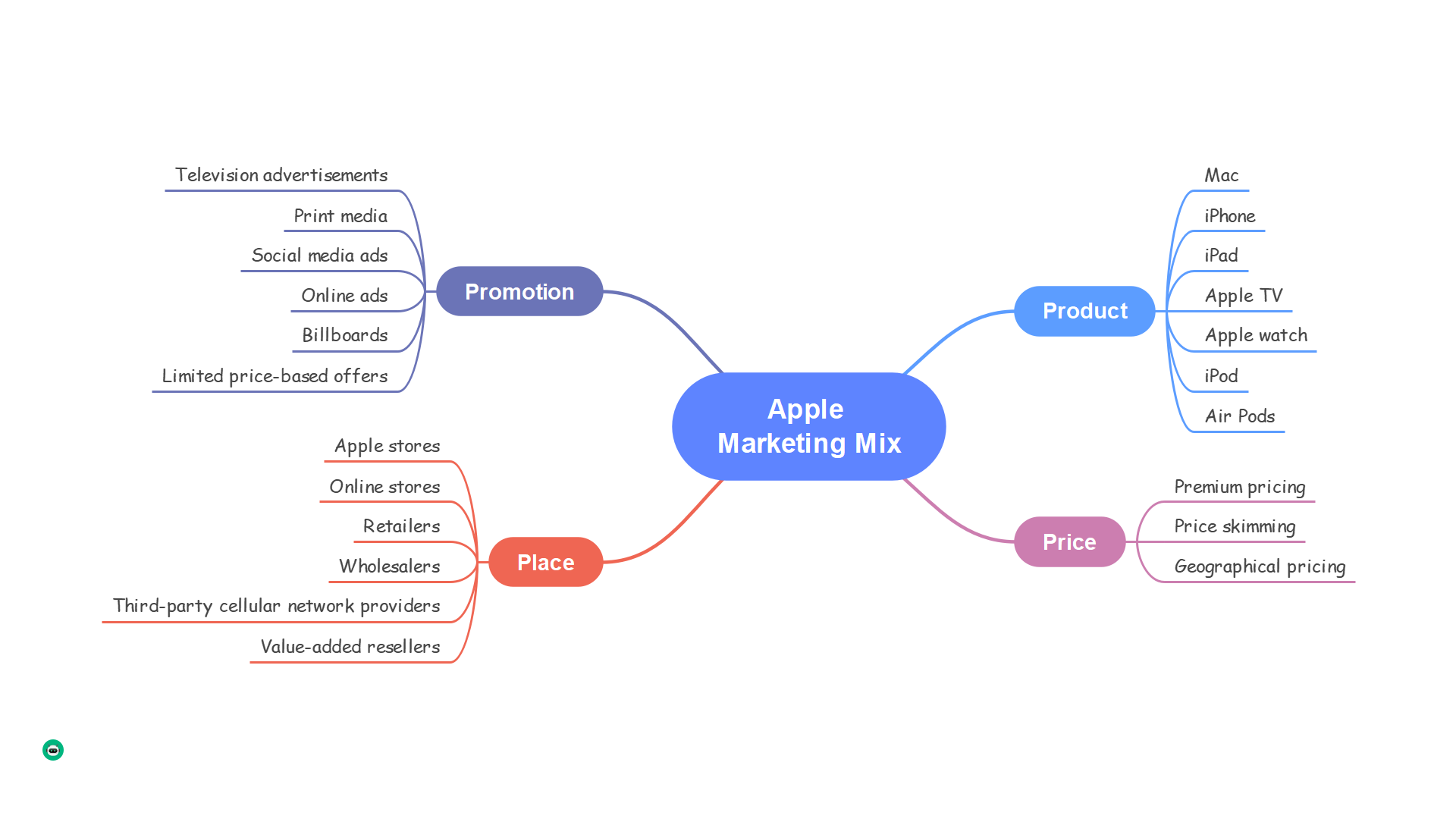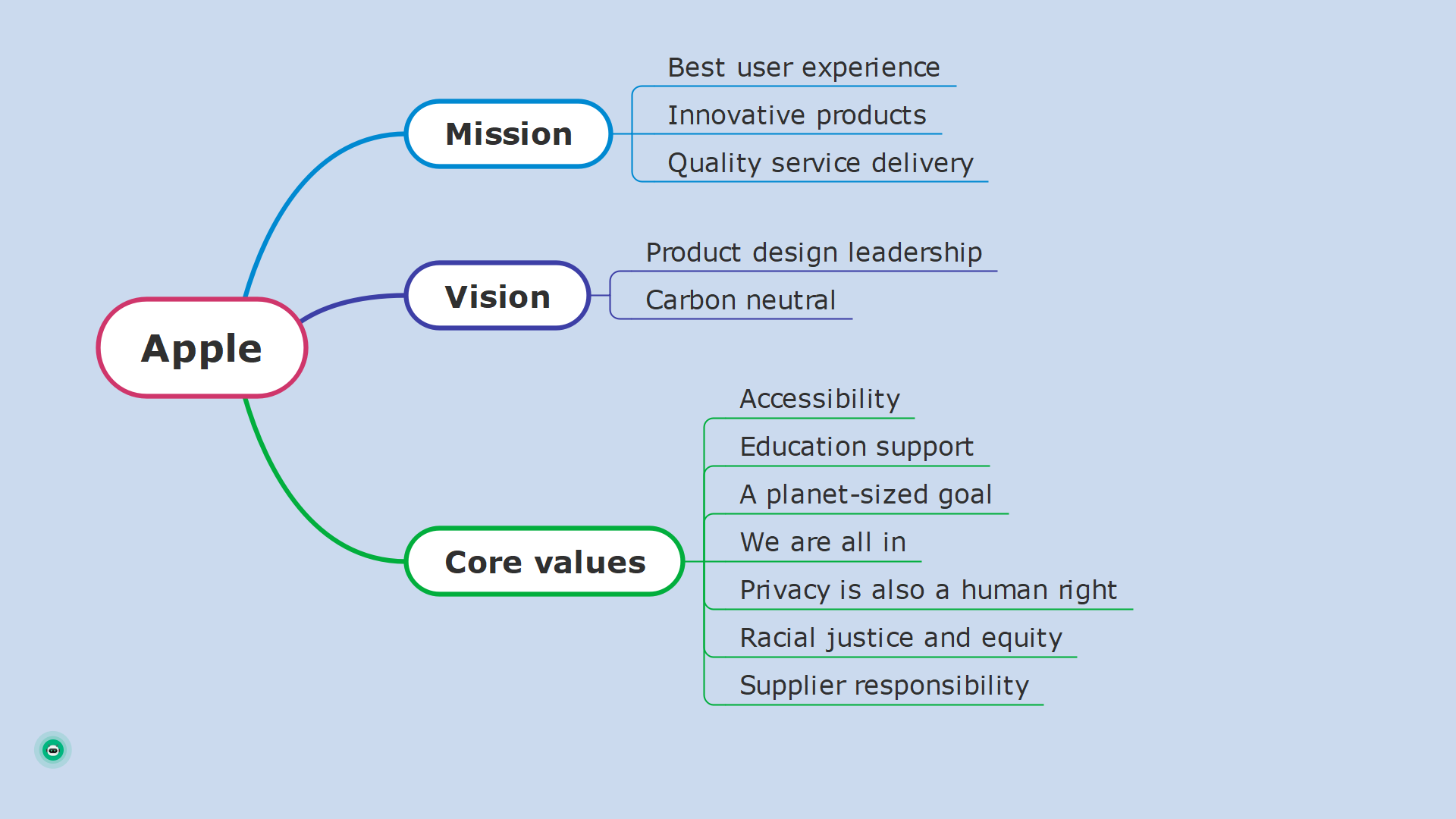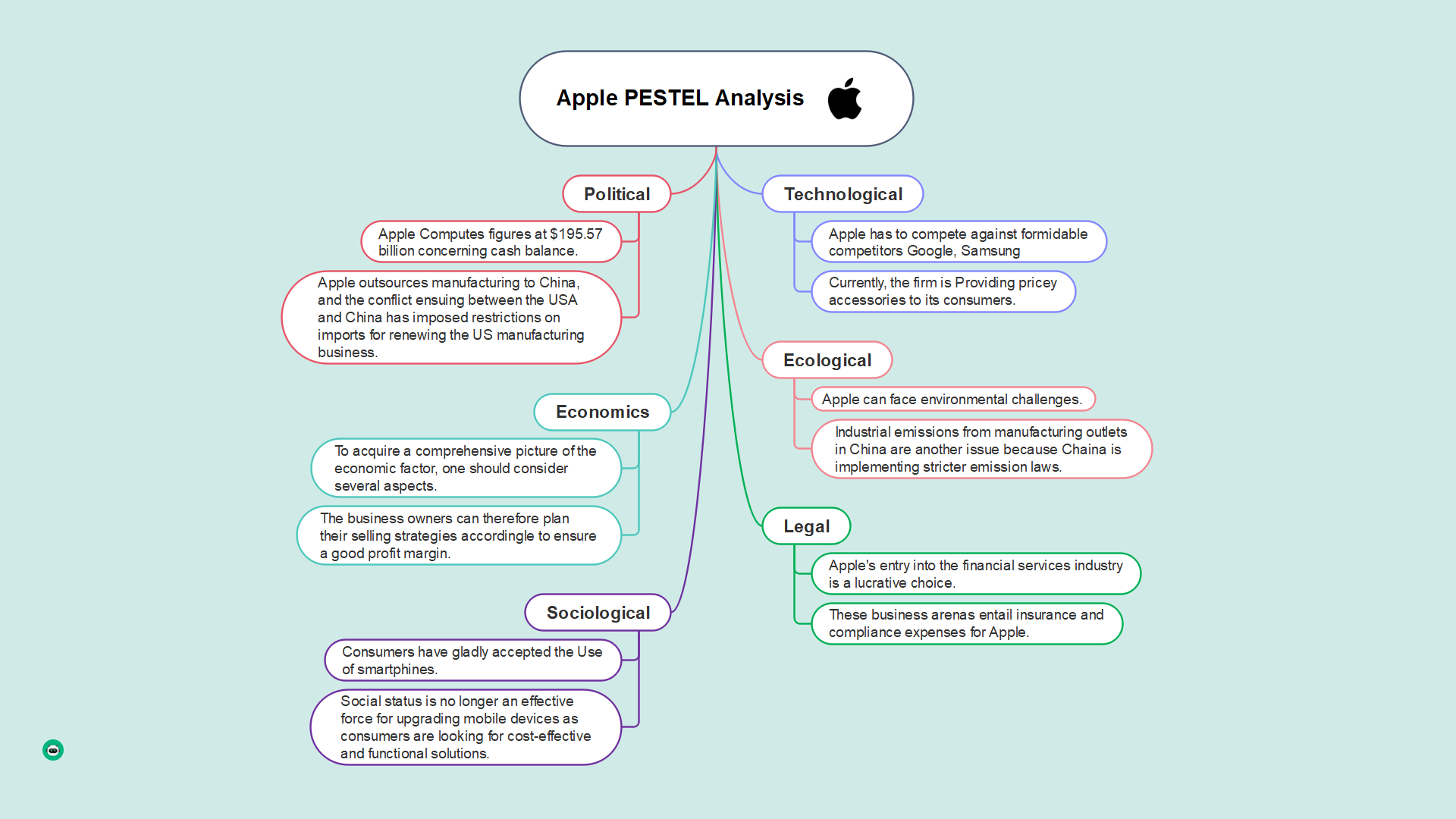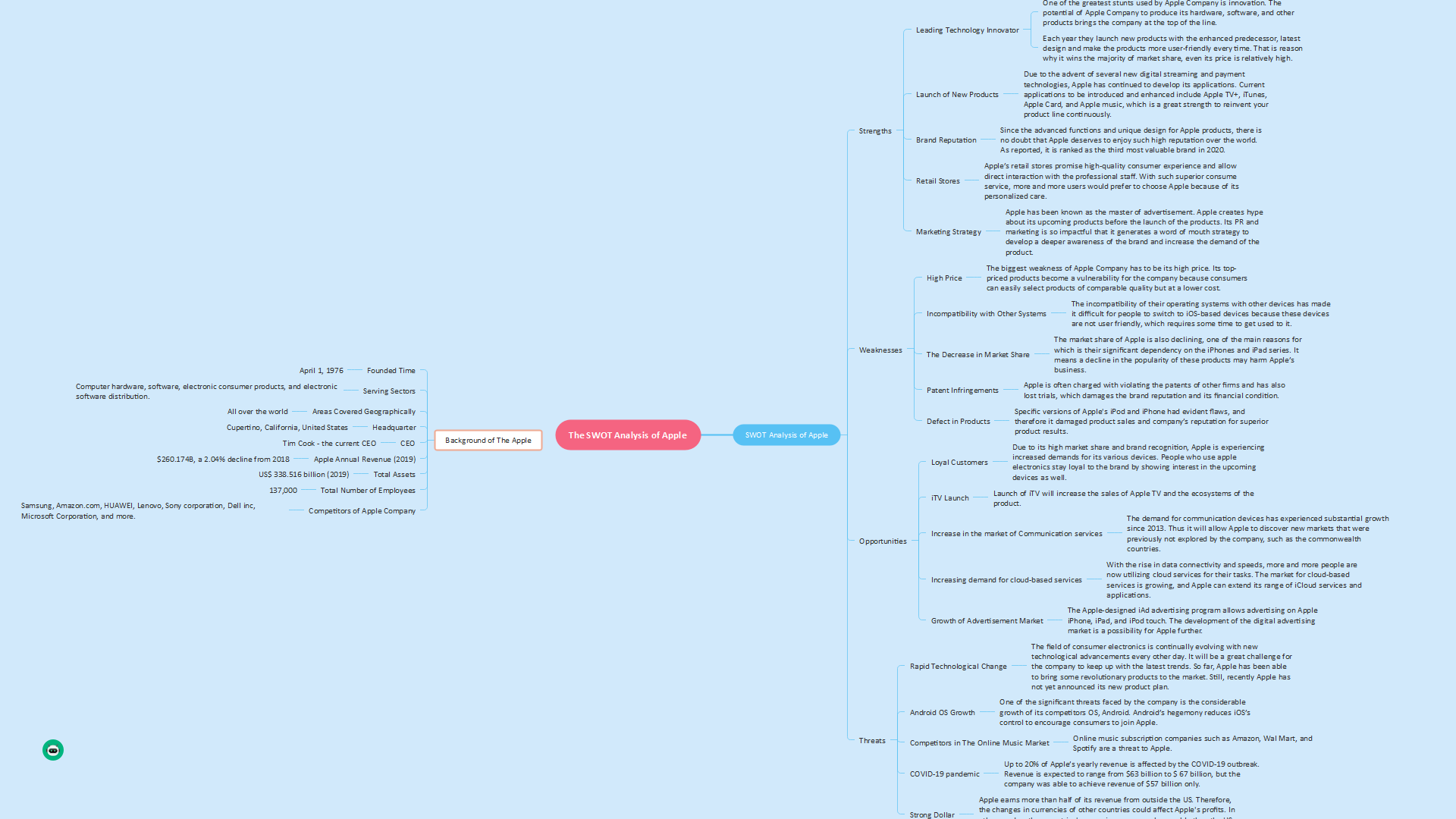Apple Segmentation, Targeting, and Positioning
Discover More Helpful Information!
Welcome to EdrawMind!![]() Unleash your creativity and enhance productivity with our intuitive mind mapping software.
Unleash your creativity and enhance productivity with our intuitive mind mapping software.
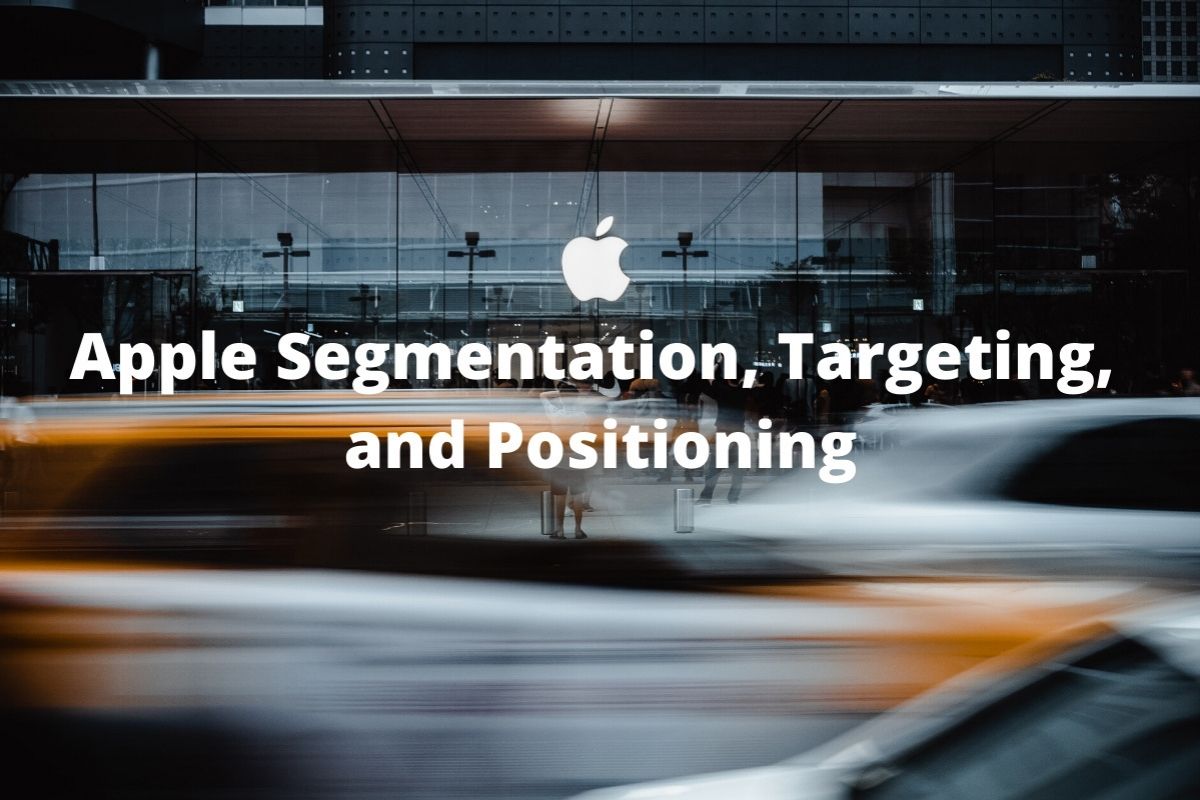
Source: unsplash.com
Market segmentation refers to identifying several elements of a market to cater to the needs of all potential consumers. It allows a company to drive a complete and unified solution that coincides with customer outreach, channel strategies, and messaging to support and sell to target customers. Segmentation calls for a thorough understanding of potential consumers and working to meet their needs (Kamakura and Wedel, 2000).
Customers have varying needs. Thus, a business will not achieve its objective to satisfy its market by treating them alike. Consumers must be treated according to their specific needs. An example of this is the youth and the older generation. These two markets have various needs, and meeting the demands of these groups needs different products and approaches. As with Apple's case, the company can innovatively work through its product developments and market segmentation, satisfying various needs of different age groups.
Besides segmentation, almost all companies today use the STP approach in marketing. It stands for segmentation, targeting, and positioning. This is a three-step process that explores products and services and the ways their benefits can be communicated to its target market. This model allows companies to tailor marketing approaches to meet customers' expectations.
Follow here to know Apple segmentation, targeting, and positioning, and learn principles that help your business.
1. Apple Segmentation, Targeting, and Positioning Mind Map
As you sketch your mind map, you can refer to this example:
2. Market Segmentation of Apple
With Apple, Market segmentation is grouped into behavioral and psychographic variables. Segmenting is a process of grouping the audience into smaller segments based on specific characteristics like occupation, gender, age, and other customer preferences. These segments or variables must be accessible, measurable, and actionable to benefit the company.
Apple's demographic market segmentation includes developing its products around the target customers' age, lifestyle, and occupation. Apple's products are then distributed to various areas and classified based on family size and age (Bara & Al-Refaie, 2016). An example of this is a PC with the latest features and software for professionals and a PC containing more games for kids. You might also notice that Apple provides several features to its other gadgets. Those with the higher graphic resolution for the younger people and digital watches with the capabilities to monitor one's pulse rate will be highly favored by the later generations.
Since Apple caters to a broader range of global markets, geographic elements must be considered part of its segmentation. As of December 2021, Apple already has more than 500 retail stores across 25 countries worldwide. Besides its physical locations, customers can access its products through online retail stores wherever they may be in the world. This way, Apple can expand its market and reach several customers.
Apple also includes the behavioral variables of its target market in its market segment. It consists of the attitudes, usage, responses, and product knowledge. The psychographic element of Apple's market segmentation tackles developing products based on the target market's lifestyles.
3. Targeting of Apple
Apple targeting strategies involve determining the more attractive segments for the firm. This stage implies choosing particular groups identified from the segmentation process, where Apple can sell their products to. The company positions its brand as a premium provider of products and services with high-quality and advanced functions and capabilities.
Apple's target customers include the well-off individuals willing to spend more on technology products and services with advanced capabilities, functions, and designs. After years of evaluating Apple's customers' characteristics, it has revealed that most of them tend to appreciate quality, performance, and design of tech products and services over the prices.
4. Positioning of Apple
The positioning approach for every marketing plan plays a critical role in promoting a brand image in the customers' minds. A practical and critically selected positioning strategy can hugely influence the firm's success. When deciding on the brand's positioning, companies vary on the aspects they want to highlight and emphasize, based on the industry, company time, size, and products.
The technology industry is rapidly growing and constantly evolving, hence the continuous introduction of new products with technical resolutions and innovative features. Apple is one of the top firms in this sphere, and most of the players in the industry often look up to Apple, its new technologies and products.
This success is partially due to its solid and effective positioning based on various elements. Apple positions itself in the market as a premium brand sought by everyone. Surely, the company's products are not cheap, but you will find people, even those who cannot afford to find ways to get their hands on Apple products.
Apple positioning its brand to create an emotional connection with its customers through exceptional experiences is an excellent approach, especially in this competitive industry. In the same manner, Apple uses its positioning approach based on competition. Since competition is tight in the technology industry, Apple ensures to continuously invest in R&D and introduce innovative products and features all the time. It keeps on making unique technologies for the brand and cannot be copied anywhere else.
5. Table of Apple Segmentation, Targeting, and Positioning
Here's how Apple segmentation, targeting, and positioning look when organized in a chart. This is just an overview of classifying the segments and other elements. Apple has a wide array of products; hence, it can be expected to have more lists for every product and service they offer.
Apple's Targeting
|
Segmentation Type |
Positioning |
||
|
Devices: iPhone, iPad, iPod, Mac |
Services: Mac App Store, Apple Pay, iCloud, iTunes, and iTunes Store |
Brand identity, overall user experience, emotional branding through innovation, imagination, and design, |
|
|
Geographics |
|||
|
Region |
US and International |
US and International |
|
|
Density |
Urban |
Urban |
|
|
Demographics |
|||
|
18-45 |
18-30 |
||
|
Males & Females |
Males & Females |
||
|
Bachelor, newly married couple, Full Nest I and II |
Bachelor, newly married couple, Full Nest I and II |
||
|
Income |
High Earners |
High Earners |
|
|
Occupation |
Professionals, executives, and managers |
Professionals, managers, and students |
|
|
Behavioral |
|||
|
Degree of Loyalty |
'Hardcore loyals' and 'switchers' |
'Hardcore loyals' and 'switchers' |
|
|
Benefits sought |
Self-expression, Speed of service, advanced features and tools, sense of belongingness and achievement |
Efficiency and speed of service |
|
|
Personality |
Ambitious and determined |
Ambitious and determined |
|
|
Psychographic |
|||
|
Lifestyle |
Explorer, aspirer, succeeder, resigned |
Succeeder, aspirer, explorer |
|
|
Social class |
Middle and upper classes |
Middle and upper classes` |
Bonus: Four More Types of Analysis of Apple
Unlock your marketing potential by using the diagrams below. Dive into the world of Apple's segmentation, targeting, and positioning. Explore the tools and insights you need to refine your brand's strategy.
Apple Marketing Mix
The diagram below provides a straightforward overview of Apple's marketing strategy. The main topic branches into four key elements: promotion (including ads), product (current Apple offerings), place (availability), and price (product costs).
The diagram is valuable when conducting market analysis, crafting marketing strategies, or presenting insights to stakeholders. It offers a concise visual representation of Apple's approach. It's an effective tool for dissecting and learning from their successful marketing tactics. You can incorporate the diagram when devising a similar strategy for your own business.
Apple's Mission, Vision, and Core Values
The "Apple's Mission, Vision, and Core Values" diagram illustrates Apple's guiding principles. The mission emphasizes an exceptional user experience, innovation, and quality service. The vision focuses on cutting-edge product design and a commitment to being carbon-neutral. Core values encompass accessibility, ambitious environmental goals, collective commitment, and privacy rights.
This diagram is beneficial when studying Apple's corporate culture. You can follow a similar strategic objective or align your company's values with industry-leading standards. It provides a visual reference for understanding and incorporating these principles into your organizational ethos.
Apple PESTEL Analysis
The Apple PESTEL Analysis diagram dissects the macro-environmental factors influencing Apple. It is segmented into six main branches: Political, Technological, Ecological, Economic, Legal, and Sociological aspects. You can use this diagram when conducting market research, strategic planning, or competitor analysis.
The diagram can help businesses understand the external forces shaping Apple's decisions. It enables you to anticipate and adapt to similar factors impacting your organization. Making a similar analysis is a valuable tool for gaining insights into the broader market dynamics. It ensures informed decision-making in various industry scenarios for you and your company.
Apple SWOT Analysis
The SWOT Analysis of the Apple diagram provides a holistic view of Apple's internal and external factors. It covers strengths (innovation and brand reputation), weaknesses (high prices, incompatibility, infringements, and defects), opportunities (loyal customers and cloud-based demand), and threats (Android OS growth, technological shifts, currency fluctuations, and pandemics).
It's ideal for market strategists, investors, or competitors looking to assess Apple's position. Understanding the diagram lets you make informed decisions in a rapidly evolving tech landscape. The tool helps identify key areas for improvement, leverage strengths, and prepare for potential threats and opportunities.
Key Takeaways
As you explore every element of Apple segmentation, targeting, and positioning, or STP, you surely have found ideas and principles that can be useful for your brand. While you may find it intimidating, it's a given considering the broad scope of Apple's market. However, if you are a startup brand, you can streamline the list above and select only those related to your company's marketing strategy.
Together with outlining and classifying these elements on your marketing approach should be a reliable diagramming tool. EdrawMind is a user-friendly mind mapping software that allows users to navigate its straightforward interface and take complete control of utilizing its features and tools. You can create from scratch or choose from various pre-built templates on Market segmentation and STP analysis to guide you in making the diagram. The pre-built ones provide a simple structure that you only need to input information on every section of the diagram. Forget the hassle of building the skeleton, as EdrawMind will do that for you.
